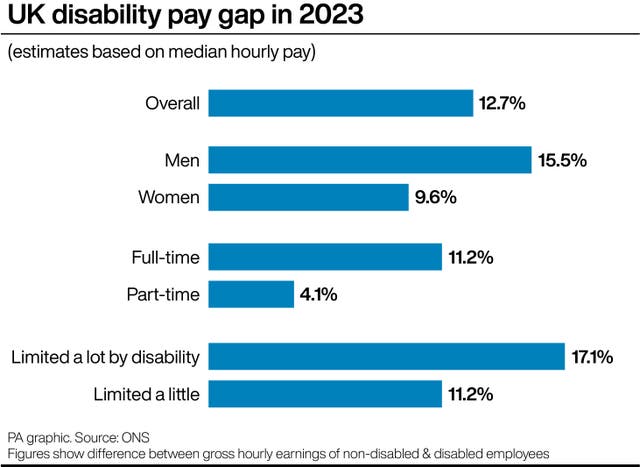Estimated £2 per hour pay gap for disabled employees ‘infuriating’
The latest estimated gap was wider for men than women and for full-time employees compared with part-time workers.

Disabled workers are likely to earn on average two pounds less an hour than their non-disabled counterparts, according to estimates a charity has branded “infuriating”.
The disability pay gap in the UK was 12.7% in 2023, the latest Office for National Statistics (ONS) analysis suggests.
The gap – the difference between the median gross hourly earnings of disabled employees and non-disabled employees – has “remained broadly stable” since 2014, the statistics body said, although the trend suggests a slight narrowing from 13.8% in 2021.

National disability charity Sense said the gap is “fundamentally unfair” and has “got no better over the past decade”.
The latest estimated gap was wider for men, at 15.5%, compared with women for whom it was 9.6%.
For full-time employees there was a gap of 11.2% while for part-time employees it was 4.1%.
The ONS analysis counted people as disabled if they had a physical or mental health condition or illness which has or is expected to last at least 12 months and reduces their ability to carry out day-to-day activities.
People in more senior roles in professional jobs such as managers and directors had one of the widest disability pay gaps at 11.1%.
Those in jobs such as sales and customer service or what the ONS described as “caring, leisure and other service occupations” had narrower gaps, at 1.1% or less.
When selected characteristics such as age and occupation were taken into account, the disability pay gap remained but was smaller for most groups, the ONS said.
The greatest difference when other characteristics were accounted for was in autistic workers, with the pay gap narrowing from 27.9% to 8.2% – a fall of 19.7 percentage points.
The adjusted pay gap was biggest for people with epilepsy (14.7%), severe disfigurements, skin conditions and allergies (11.9%), and problems or disabilities connected with legs and feet (9.0%).
Harriet Edwards, head of policy at Sense, said: “It’s infuriating that disabled people still earn significantly less than non-disabled people. This is fundamentally unfair and the persistent gap has got no better over the past decade.
“Disabled people deserve better. Sense research found that over half (52%) of people with complex disabilities in work said they’d taken a less challenging role because their needs as a disabled person were not being met by employers. That shameful lack of support needs to change.
“And it needs to be made possible for disabled people to find new jobs in the first place, otherwise they will always be blocked from progressing and earning more.
“Providing screen readers and braille displays in job centres across the country, through a £5 million assistive tech fund, would be a sensible and affordable start.
“Employers and the government need to listen and take action now, to stop disabled people being held back all through their working lives.”
The Government has voiced its “strong commitment” to “end pay discrimination” by expanding the Equality (Race and Disparity) Bill to make it mandatory for large employers to report both their ethnicity and disability pay gaps.
TUC general secretary Paul Nowak said it is a “shameful indictment that over the last decade the pay gap has remained so stubbornly high”.
He said: “We welcome this Government’s landmark commitment to introduce mandatory disability pay gap reporting, which will shine a light on inequality at work. We also need solid plans that outline what employers must do.
“The Employment Rights Bill could be a game changer for disabled workers, helping millions of disabled workers move on from years of lower pay, zero-hours contracts and in-work poverty.”





